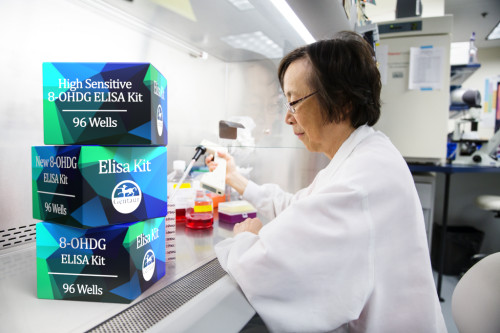Product Description
Anti 8-OHdG monoclonal antibody
About 8-hydroxy-2'-deoxyguanosine (8-OHdG):
Reactive oxygen species (ROS) and oxidative stress may be crucial for development of various diseases such as diabetes, cancer, and may play an important role in the aging process. 8-hydroxy-2'-deoxyguanosine (8-OHdG) is a product of oxidatively damaged DNA formed by hydroxy radical, singlet oxygen and direct photodynamic action. 8-OHdG can be detected in tissue, serum, urine and other biomaterials. Anti 8-OHdG monoclonal antibody (clone N45.1) is highly specific for DNA damage, not cross react with RNA oxidation products such as 8-hydroxy-guanine and 8-hydroxy-guanosine. Suitable for immunohistochemistry and ELISA.

| Specifications |
| Clone #: |
N45.1 |
| Antigen: |
8-OHdG-conjugated Keyhole Limpet Hemocyanin |
| Subclass: |
Mouse IgG1(kappa)
Prepared as ascite, and ammnonium sulphate purified. |
| Form: |
Lyophilized Powder |
| Package: |
20 or 100 µg of IgG / vial (MOG-020P and MOG-100P respectively). |
| Specificity: |
19 analogues of 8-OHdG {guanosine (G), 7-methyl-G, 6-SH-G, 8-bromo-G, dA, dC, dT, dI, dU, dG, O6-methyl-dG, 8-OHdA, guanine (Gua), O6-methyl-Gua, 8-OHGua, uric acid, Urea, creatine, creatinine} demonstrate no cross-reactivity. Only 8-sulfhydryl-G and 8-OHG demonstrate minimal cross-reactivity (less than 1%). |
| Use: |
Immunohistochemistry and ELISA |
| Storage: |
Less than -20°C for 5 years
When transport, stable at least 7 days at room temperature. |
|
Size
Size 100 ug of IgG/vial
Type of Marker DNA Oxidation
Marker TG
Storage Less than -20°C
Usage Tissue
Application Immunohistochemistry
Remark DNA-specific oxidative stress marker.

 Euro
Euro
 USD
USD
 British Pound
British Pound
 NULL
NULL












